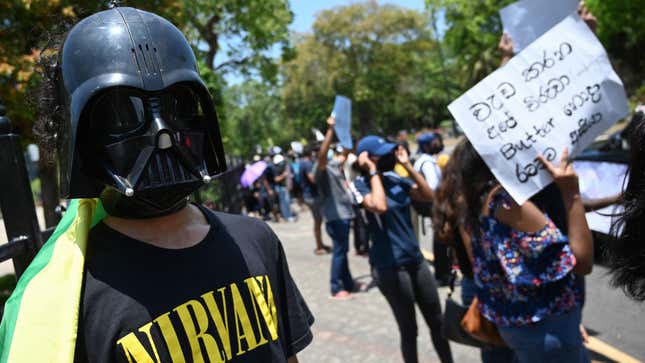
The government of Sri Lanka lifted a short-lived ban on all social media Sunday after officials apparently remembered that VPNs exist.
The ban was instituted because protesters have taken to the streets over an economic crisis that’s left many shops in Sri Lanka without basic essentials, with some protestors targeting the personal home of President Gotabaya Rajapaksa.
Virtual private networks (VPNs) are apps that allow internet users to circumvent website bans, though countries that ban access to VPNs can make it much tougher for the average internet user to get around the blockades. In this case, Sri Lanka didn’t seem prepared to ban VPNs that politicians in the country also admit to using.
Namal Rajapaksa, Youth Minister and a son of the Prime Minister, said on Sunday that anyone can use a VPN to bypass the social media ban, and explained he didn’t want the government to block apps like Twitter.
“I will never condone the blocking of social media. The availability of VPN, just like I’m using now, makes such bans completely useless. I urge the authorities to think more progressively and reconsider this decision,” Rajapaksa said in a tweet on Sunday.
Rajapaksa later announced he was resigning from his role as the Minister for Youth on Monday, along with other government officials.
The Sri Lankan government imposed a curfew Saturday night as the country continued to see protests from people upset over soaring food prices and a lack of basic necessities on supermarket shelves. At least 650 people were arrested for breaking the curfew in Western Province, which includes the country’s capital city of Colombo, according to Germany’s DW news service. Journalists were reportedly among those arrested, according to the BBC.
Sri Lanka, with a population of 22 million, has seen many cabinet ministers resign in recent days, but the Prime Minister and President are both still in power. President Gotabaya Rajapaksa is brothers with the Prime Minister, Mahinda Rajapaksa.
Gotabaya Rajapaksa, a Buddhist, was previously the defense secretary of Sri Lanka and has been criticized for human rights abuses during the country’s civil war, including crimes against Tamils and Muslims. The civil war ended in 2009.
“I would call these dictatorial, autocratic and draconian steps,” government opposition leader Sajith Premadasa said at a protest on Sunday about the curfew, according to the BBC.